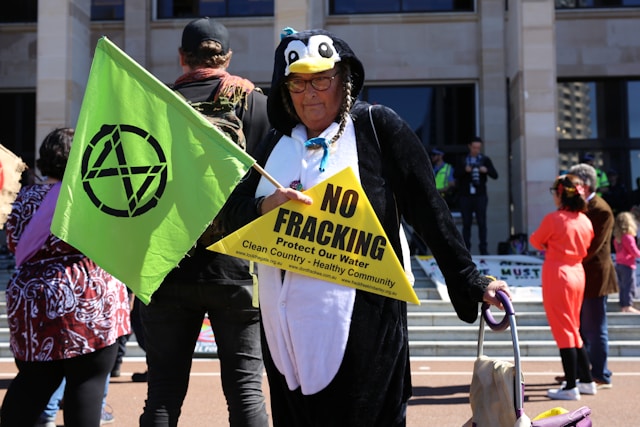by Deep Green Resistance News Service | Mar 23, 2012 | Protests & Symbolic Acts, Toxification
By the Associated Press
A 93-year-old anti-nuclear activist was among more than 130 protesters arrested at the corporate headquarters of the Vermont Yankee nuclear power plant on the first day of the plant’s operation after the expiration of its 40-year license.
Frances Crowe, of Northampton, Mass., said she wants Vermont Yankee to cease operations because she feels it’s a threat to the people who live nearby.
“As I was walking down, all I could think of was Fukushima and the suffering of all the people, and I don’t want that to happen to New England,” Crowe said, referring to the Japanese nuclear reactor damaged last year after an earthquake and tsunami.
When asked how many times she’d been arrested, she answered: “Not enough.”
A heavy police presence and ropes blocked off access to the offices in Brattleboro during Thursday’s protest. The arrests were made calmly and without any confrontation, with obvious signs that protesters and police had worked out the logistics beforehand.
Brattleboro Police Chief Gene Wrinn said in a statement that more than 130 people had been arrested for unlawful trespass. He said after being processed, they were later released.
Read more from The Huffington Post
by Deep Green Resistance News Service | Mar 22, 2012 | Colonialism & Conquest, Indigenous Autonomy, Protests & Symbolic Acts, Toxification
By Indigenous Environmental Network
Native Americans gathering in Cushing, OK today to protest President Obama’s words of praise for the Keystone XL pipeline were forced by local authorities to hold their event in a cage erected in Memorial Park. The protestors were stunned that their community, so long mistreated, would be insulted in such an open manner instead of being given the same freedom of speech expected by all Americans simply for taking a stance consistent with their values.
“A lot of tribal councils and Indian businesses struggle to find a balance between economic resources and our inherited responsibilities for the earth,” said Indian actor and activist Richard Ray Whitman in a statement. “How will the decisions we make now effect coming generations?”
“President Obama is an adopted member of the Crow Tribe, so his fast-tracking a project that will desecrate known sacred sites and artifacts is a real betrayal and disappointment for his Native relatives everywhere,” said Marty Cobenais of the Indigenous Environmental Network. “Tar sands is devastating First Nations communities in Canada already and now they want to bring that environmental, health, and social devastation to US tribes.”
The President visited Cushing to stand with executives from TransCanada and throw his support behind a plan to build the southern half of the controversial Keystone XL pipeline to move tar sands bitumen and crude oil from Cushing to the Gulf Coast refineries in Texas.
A major concern for Native Americans in Oklahoma, according to spokespeople at the event, is that Keystone XL and the Canadian tar sands mines that would supply it ignore impacts to indigenous communities and their sacred spaces.
“Natives in Canada live downstream from toxic tar sands mines,” said Earl Hatley, “and they are experiencing spikes in colon, liver, blood and rare bile-duct cancers which the Canadian government and oil companies simply ignore. And now they want to pipe these tar sands through the heart of Indian country, bulldozing grave sites and ripping out our heritage.”
The group points to a survey done by the Oklahoma Archeological Survey which found 88 archaeological sites and 34 historic structures that were threatened by Keystone XL. TransCanada was asked to reroute around only a small portion of these, leaving 71 archaeological sites and 22 historic structures at risk. The group says they have asked for a list of these sites and to oversee operations that might threaten sacred burial grounds, but neither request has been honored.
Beyond the threat to their own cultural heritage, the group voiced opposition to the pipeline’s environmental impacts.
“The Ogallala Aquifer is not the only source of water in the plains,” said RoseMary Crawford, Project Manager of the Center for Energy Matters. “Tar sands pipelines have a terrible safety record and leaks are inevitable.”
“We can’t stop global warming with more fossil fuel pipelines,” added Crawford. “The people who voted for this President did so believing he would help us address the global environmental catastrophe that our pollution is creating. He said he would free us from ‘the tyranny of oil.’ Today that campaign promise is being trampled to boost the President’s poll numbers.”
From Indigenous Environmental Network:
by Deep Green Resistance News Service | Mar 20, 2012 | Protests & Symbolic Acts, Repression at Home
By Jeemon Jacob / Tehelka
Tamil Nadu government started “operation Koodankulam “on Monday 19 March, arresting 203 protesters and blocking all entry points to the coastal villages surrounding the nuclear power plant. Police arrested 185 men including parish priest Father Suseelan at Kottupuli village where they were protesting against the deployment of police forces. They were taken to Tirunelveli Armed Reserve Camp. Later police arrested 18 men from Koodankulam on charges of staging protests and violating Section 144 of the Indian Penal Code.
Police started the crackdown on anti-nuclear plant protesters early on Monday arresting nine people including People’s Movement against Nuclear Energy (PMANE) legal advisor Sivasubramanian and Rajalingam. They are being charged with sedition including Sections 121, 121A and 153A. They were taken to Tirunelveli. Around 4000 state police and 400 central police officials have been deployed in the area. Police have set up seven more police pickets around Koodankulam nuclear plant and blocked entry points.
According to Dr SP Udaykumar, convener, People’s Movement against Nuclear Energy, who is on a indefinite hunger strike along with Pusparayan, his associate at Idinthakarai, around 5000 people assembled at the St Lourdes Church ground since Monday. “We, eight men and seven women, are on an indefinite hunger strike. The green signal for Koodankulam is a red signal for our lives. We will continue our protest till we die,” said Udayakumar.
To beat the police blockade, protesters were seen using fishing boats to ferry people to the protest grounds. “We were able to bring our people to Idinthakarai On Monday. But this morning (Tuesday) onwards, the Coast Guard and Navy used helicopters for surveillance in the area,” said Udayakumar.
Police have also intensified patrolling in the area and are waiting for orders from Tamil Nadu Chief Minister Jayalalitha to enter Idinthakarai. Additional Director General of Police S George is camping in the area and overseeing the Koodankulam operation.
According to a senior police official, the state government wanted a ‘silent clearance operation’ in Koodankulam. “We have requested media to vacate the premises and sealed all entry points. We will use force only as a last resort,” said the police official who wished to remain anonymous. According to sources, the police have cut power supply to Idinthakarai and are planning to delink the water supply to the village.
“We are protesting peacefully. We will continue our protests till our demands are met,” said Pushparayan. According to him, the protesters want an immediate release of people arrested and the withdrawal of Tamil Nadu cabinet resolution. “We have been ditched by the Tamil Nadu government, they will pay for the betrayal and treachery,” Udayakumar told TEHELKA.
Udayakumar asked why the state government was not ready to conduct the safety drill around the 30 kilometer radius of the power plant which is mandatory before commissioning a nuclear plant. “The government is violating basic safety requirements before commissioning the plant. In such a situation we have no other option,” said Udayakumar. He warned of public health problems and food shortage at Idinthakarai and appealed to the people of Tamil Nadu to be aware of “this assault on the Tamil community”.
“They [government] are preparing to load uranium fuel rods into the reactor without conducting safety or evacuation drills. This kind of Fascist development is taking our country to another round of New East India Companies and Neo-colonialism,” said Udayakumar. Dr V Suresh, National Secretary, PUCL, Tamil Nadu-Puducherry condemned the police action by the Tamil Nadu State Government against peaceful demonstrators.
“The police action against Idinthakarai villagers resembles the Jalianwalabagh incident and raises concerns about the state government’s intention. This action comes immediately after the Sankarankovil by-elections.” said Dr Suresh. The PUCL has demanded an immediate and unconditional release of all arrested villagers and withdrawal of police force from the area.
From Tehelka: http://www.tehelka.com/story_main52.asp?filename=Ws200312Nuclear.asp

by Deep Green Resistance News Service | Mar 17, 2012 | ACTION, Indirect Action, Mining & Drilling
By Fiona Harvey / The Guardian
The biggest meeting on the issue of fracking for shale gas to be held in the UK will take place in Manchester on Saturday in an attempt to set up a broad nationwide coalition to stop the controversial practice.
Protest groups have been set up in areas currently affected by shale gas exploration activities or likely to be the sites of fracking in future.
But anti-fracking campaigners want to step up the pace of their protests as support for shale gas grows rapidly in some political circles.
The concerns over fracking follow its widespread use in the US over the last few years. Environmentalists say it has caused contamination of water supplies, gas leaks and the despoliation of the countryside over wide areas.
They want to ensure that similarly destructive practices do not take hold in the UK. Green groups also fear that an over-emphasis on gas will put carbon-cutting targets far out of reach – some research even suggests that shale gas from fracking produces more greenhouse gas emissions than coal when burned – and will crowd out investment in renewable forms of energy.
But Cuadrilla, the only UK company currently engaged in fracking, argues that the bad examples of the US would not apply in the UK, where the industry is more tightly regulated.
The company has invited people to its site and says its equipment and methods are of a higher standard than those that have caused problems in the US.
All fracking operations for shale gas in the UK are currently suspended, pending scientific evaluation of two small earthquakes in the Blackpool area last year that, according to a report from European seismic experts, were directly linked to fracking operations in the area.
Read more from The Guardian
Photo by Paul-Alain Hunt on Unsplash

by Deep Green Resistance News Service | Mar 15, 2012 | ACTION, Indigenous Autonomy, Lobbying, Mining & Drilling
By Shawn McCarthy / The Globe and Mail
Ottawa is headed for a legal showdown with British Columbia first nations if it insists on proceeding with the Northern Gateway pipeline, the leader of the Yinka Dene Alliance warns.
Chief Jackie Thomas, of the Saik’uz First Nation, was part of a delegation in Ottawa Tuesday meeting with opposition members of Parliament to build support for their anti-pipeline stand. She said her group will pursue a legal challenge if Ottawa approves the pipeline over their objections.
Along with other first-nation communities, the Dene alliance has taken a firm stand against Enbridge Inc.’s plan to build a crude oil pipeline across their land to transport oil-sands bitumen to the B.C. coast for export to Asia.
“We will defend our rights, no matter what bully tactics the federal government throws at us,” she said. “Our decision has been made: Enbridge will never be allowed in our lands.”
Natural Resources Minister Joe Oliver has lashed out at opponents to the Gateway pipeline, saying they are undermining the country’s national interest and oppose all resource development.
Prime Minister Stephen Harper has made it a key priority of his government to diversify oil and natural gas exports beyond the traditional U.S. market to target growing Asian markets.
Ms. Thomas said the Saik’uz community is not anti-development. It is working with other mining, forestry and energy companies on projects. It is partnering with Apache Corp., a U.S. oil company, on a pipeline to feed a liquefied natural gas plant in Kitimat, which would also be aimed at exporting energy to Asia.
But the community feels an oil pipeline would be far more risky, and far more disruptive to the salmon fisheries and other species.
“They can’t attempt to offset the water needs of my community, the salmon that goes in the water, and the animals and plants on the land that are in jeopardy,” Ms. Thomas said.
Read more from The Globe and Mail:
Photo by Jake Hills on Unsplash

by Deep Green Resistance News Service | Mar 9, 2012 | Colonialism & Conquest, Indigenous Autonomy, Mining & Drilling, Protests & Symbolic Acts
By Environment News Service
Several hundred members of the largest Ecuadorian indigenous organization today began marching to the capital, Quito, to protest new mining in their territory. They expect to arrive in Quito on March 22.
The indigenous march started from Yantzaza in Zamora Chinchipe province southern Ecuador, where a Canadian company has been authorized to develop a large open-pit copper mine – the first large-scale mine under a new government mining policy.
The Confederation of Indigenous Nationalities of Ecuador, CONAIE, says that at the heart of the current discontent is not only this particular mine but also President Rafael Correa’s plans to allow international companies to carry out large-scale mining projects.
They are demanding that the government pass legislation to regulate water management and land redistribution.
On March 5, the Correa government signed an agreement with Ecuacorriente, the local unit of British Columbia-based Corriente Resources Inc., that allows the company to mine the Mirador copper project, according to Wilson Pastor, minister of nonrenewable natural resources.
Pastor said the company intends to invest about $1.4 billion over the next five years in the Mirador project. Ecuacorriente will pay $100 million in advance royalties to fund social projects in areas around the mine.
But as people gathered today in Zamora Chinchipe to start the march, provincial prefect and indigenous leader Salvador Quishpe reiterated their concerns for aboriginal communities where mining pollutes formerly pristine lands and rivers.
Read more from Environment News Service:
- First and foremost we must recognize that non-indigenous people are occupying stolen land in an ongoing genocide that has lasted for centuries. We must affirm our responsibility to stand with indigenous communities who want support and give everything we can to protect their land and culture from further devastation; they have been on the frontlines of biocide and genocide for centuries, and as allies, we need to step up and join them.
- You are doing Indigenous solidarity work not out of guilt, but out of a fierce desire to confront oppressive colonial systems of power.
- You are not helping Indigenous people, you are there to: join with, struggle with, and fight with indigenous peoples against these systems of power. You must be willing to put your body on the line.
- Recognize your privilege as a member of settler culture.
- You are not here to engage in any type of cultural, spiritual or religious needs you think you might have, you are here to engage in political action. Also, remember your political message is secondary to the cause at hand.
- Never use drugs or alcohol when engaging in Indigenous solidarity work. Never.
- Do more listening than talking, you will be surprised what you can learn.
- Recognize that there will be Indigenous people that will not want you to participate in ceremonies. Humbly refrain from participating in ceremonies.
- Recognize that you and your Indigenous allies may be in the minority on a cause that is worth fighting for.
- Work with integrity and respect, be trustworthy and do what you say you are going to do.



